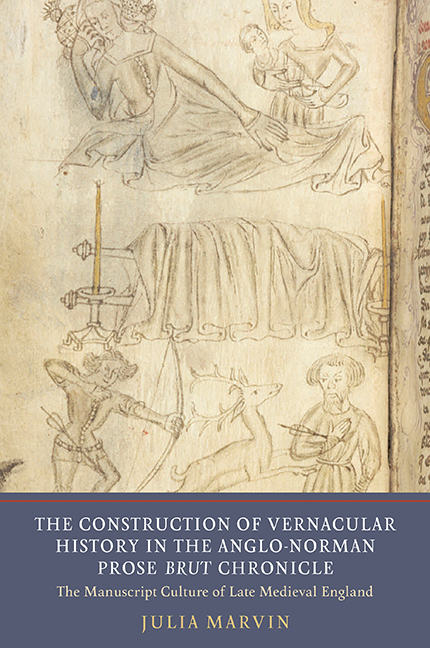 The Construction of Vernacular History in the Anglo-Norman Prose Brut Chronicle
The Construction of Vernacular History in the Anglo-Norman Prose Brut Chronicle Book contents
- Frontmatter
- Dedication
- Content
- List of Plates
- Acknowledgments
- Abbreviations
- A Note on Proper Names, Transcriptions, and Translations
- Introduction: Recognizing the Prose Brut Tradition
- Part I Construction
- Part II Reconstruction and Response
- Conclusion: Merlin's Power
- Bibliography
- General Index
- Index of Manuscripts Cited
Conclusion: Merlin's Power
Published online by Cambridge University Press: 01 February 2018
- Frontmatter
- Dedication
- Content
- List of Plates
- Acknowledgments
- Abbreviations
- A Note on Proper Names, Transcriptions, and Translations
- Introduction: Recognizing the Prose Brut Tradition
- Part I Construction
- Part II Reconstruction and Response
- Conclusion: Merlin's Power
- Bibliography
- General Index
- Index of Manuscripts Cited
Summary
In the face of modern depictions of Merlin as everything from comic sorcerer complete with pointy hat to proto-environmentalist Druid, medievalists – particularly those who teach undergraduates – often find themselves emphasizing him as first and foremost a prophet in the eyes of medieval audiences. Geoffrey of Monmouth, the first main promulgator of the matter of Merlin in writing, claims that interest in Merlin's prophecies was so great that he had to stop work on the Historia to translate them. Geoffrey interrupts his narrative with an unusual first-person comment:
Nondum autem ad hunc locum historiae perueneram cum de Merlino diuulgato rumore compellebant me undique contemporanei mei prophetias ipsius edere, maxime autem Alexander Lincolniensis episcopus, uir summae religionis et prudentiae…. Cui cum satisfacere praeelegissem, prophetias transtuli et … direxi.
(‘Before I had reached this point in my history, news of Merlin spread and I was being pressed to publish his prophecies by all my contemporaries, and particularly by Alexander bishop of Lincoln, a man of the greatest piety and wisdom…. Wishing to please him, I translated the prophecies and sent them to him.’)
In the Historia, when the doomed usurper Vortiger has haled Merlin into his court, after being advised to temper the mortar of his castle's unstable foundation with the blood of someone who has no father, Merlin reveals that the foundation is undermined by a pool of water inhabited by two dragons, red and white, the sight of which inspires him to deliver a lengthy, violent, cryptic beast allegory extending well beyond the meaning of the dragons themselves. As Crick has argued, the presence of prophecy seems only to have strengthened the authority of the entire Historia for much of its audience: ‘Merlin seems generally to have enhanced, not detracted from, Geoffrey's respectability as a historian.’ Geoffrey's prophecies, which constitute Book 7 of the Historia, were also copied and transmitted separately. New prophecies were being composed and attributed to Merlin into at least the fourteenth century, and they remained common enough cultural currency that Shakespeare can have the Fool joke about them, prophesying prophecy, in King Lear.
- Type
- Chapter
- Information
- The Construction of Vernacular History in the Anglo-Norman Prose Brut ChronicleThe Manuscript Culture of Late Medieval England, pp. 231 - 260Publisher: Boydell & BrewerPrint publication year: 2017
